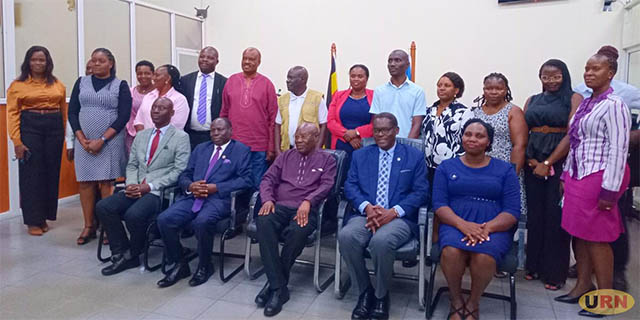
In a report presented by the chairperson of the committee Baka Mugabi, the MP for Bukooli North, the MPs agreed to merge; the Tax Appeals Tribunal, the Electricity Disputes Tribunal, the Public Procurement and Disposal of Public Assets Appeals Tribunal, the Insurance Appeals Tribunal, the Uganda Communications Tribunal, the Retirement Benefits Appeals Tribunal, the Capital Markets Tribunal and the Seeds and Plants tribunal into one National Tribunal
Kampala, Uganda | THE INDEPENDENT | Members of Parliament on the Legal and Parliamentary Affairs Committee have agreed to merge six appeal tribunals into one national tribunal to hear disputes arising from government agencies’ decisions.
In a report presented by the chairperson of the committee Baka Mugabi, the MP for Bukooli North, the MPs agreed to merge; the Tax Appeals Tribunal, the Electricity Disputes Tribunal, the Public Procurement and Disposal of Public Assets Appeals Tribunal, the Insurance Appeals Tribunal, the Uganda Communications Tribunal, the Retirement Benefits Appeals Tribunal, the Capital Markets Tribunal and the Seeds and Plants tribunal into one National Tribunal.
In their report, the MPs observed that all these tribunals are almost similarly constituted and also perform the same functions. “It is evident that all tribunals have a chairperson and specified number of members, ranging from 3 members to 7 members. They are all headed by a chairperson, who is required to be an advocate or be qualified for an appointment as a judge of the High Court. They also have other members who are appointed based on their qualifications and experience in matters of the tribunal and who are generally knowledgeable in professional matters of law, business, administration etc. The same is proposed for the National Tribunal into which they will be merged,” the MPs observed.
They added that because all the tribunals perform a similar mandate, it means that a single tribunal, properly constituted with persons possessing the relevant qualifications and experience can perform the functions of all the tribunals. “All tribunals are assisted by experts and work in panels consisting of members of the Tribunal and other experts in the matter under review. This means that a tribunal which has a deficiency in any area under review may co-opt an expert to assist it in determining the matter…The same is proposed for the National Tribunal,” the committee report reads in part.
The Committee also rejected the assertion that various stakeholders were not consulted or their views were not considered when the government decided to collapse some of these tribunals. “The Committee finds that the affected tribunals and the members were all given a fair hearing, even if their views on the matter were not taken into consideration in the final decision. The Right to a fair hearing connotes that no decision affecting a person should be made without affording the person who will be adversely affected by the decision an opportunity to respond to the allegations levelled against him or her…the right to be heard is limited to the opportunity to be heard. The Committee is satisfied that all the tribunals that were to be affected by the decision to merge or rationalize them were consulted by the government,” the report read in part.
Meanwhile in a minority report written by MPs; Jonathan Odur, Richard Lumu and Ssekitooleko Robert from opposition political parties; UPC, DP and NUP respectively, rejected the bill arguing that part of it contradicts the constitution and therefore, can’t stand. The minority report particularly points out the Tax Appeals Tribunal which is a creation of article 152 of the constitution and said it can’t simply be amended the way the committee is recommending. “It is important to note that this Article, not only commands parliament to establish tax tribunals but also to prescribes the nature of tax disputes that can be lodged before the tax tribunal. The deliberate use of the word tax before the tribunal signifies the intention of the framers of the Constitution to baptize it as a tax tribunal. It is therefore critical to note that taxation is an important tool available to the government to raise resources to deliver services to the taxpayers. The framers of the 1995 Constitution were alive to this fact and in their wisdom, which we do not have any doubt at all, gave taxation an article of its own in article 152 under the heading taxation,” the MPs observed.
The MPs also noted that by creating a national tribunal, the majority were trying to create another judicial body to handle anything like a court of law yet tribunals handle specific issues.
“Tribunals are meant to offer quick, informal and flexible mechanisms for specific disputes and the membership is carefully selected based on unique skills, experience and expertise. In essence, Tribunals are never generalized as there won’t be any difference from the Court of Law. A review of all the available literature in the entire world did not return any example of a Country with a National Tribunal which handles anything and everything,” the minority report noted.
For the last few months parliament has been reviewing different laws to collapse several government agencies with the view of stopping duplication of roles and also reducing the resources spent on these agencies.
****
URN
 The Independent Uganda: You get the Truth we Pay the Price
The Independent Uganda: You get the Truth we Pay the Price





